- +353 21 422 0397
- info@mervue.ie
- Mon - Fri: 09:00 - 17:00
Horses exhibit the greatest sweating rates of any animal. Sweat production is the primary mechanism of controlling and cooling body temperature in horses. Evaporation of sweat results in cooling of the horse. Roughly 80–70% of expended energy is transformed into heat and the majority (40–60%) of this energy needs to be removed from the body via evaporation, with the remainder eliminated through the respiratory tract. It has been estimated that horses that have been exercised very hard and are demonstrating sweat dripping from above the eyes and under the abdomen had lost 12-18L of fluid representing a not-insignificant 2-3% of their body weight. The primary components of horse sweat are electrolytes (sodium, Na; Chlorine, Cl; Potassium, K; and to a lesser extent, calcium, Ca and magnesium, Mg). These three electrolytes are important in many bodily functions not least control of heart rate as well as nerve and muscle function. Calcium is responsible for muscle contraction and magnesium is responsible for muscle relaxation. Insufficient amounts of magnesium can lead to prolonged muscle contraction and tying up. The greater the energy metabolism, the greater the sweat production and large amounts of electrolytes can be lost in a short period of time (e.g. 25% of the total body Cl can be lost in two hours of intense exercise. Sweat production is also greatly influenced by ambient temperature and humidity. High humidity especially, impairs evaporation of sweat. Excessive losses of electrolytes lead to dehydration, fatigue, prolonged recovery and poor performance.
Sweat production and evaporation rely on blood vessels close to the skin. However, as increasing amounts of sweat are lost the horse becomes progressively more dehydrated and the blood flow to the superficial blood vessels in the skin decrease to preserve the blood flow to vital organs such as the heart, the brain and muscles and cooling is compromised. Consequently, in horses which intensively exercised for long periods of time, there is a very real risk of hyperthermia (overheating) which results in severe organ damage and can be fatal.
In horses undertaking prolonged exercise with large amounts of sweat production, there is a significant loss of amino acids in sweat as well as electrolytes. Loss of amino acids which have arisen from protein (muscle) breakdown to create energy, means that these amino acids are no longer available for reuptake into tissues and recovery may be prolonged. Consequently, dietary supplementation with amino acids may support recovery.
RECOMMENDATION: RECOBOOST PASTE
RECOBOOST paste contains the key electrolytes, Na, Cl, K, Ca and Mg. It also contains branch chain amino acids (BCAA) to help to replace those lost in sweat and a range of B vitamins needed to support efficient metabolism and energy production from carbohydrates, fats and amino acids. RECOBOOST also contains antioxidant vitamins C and E.
Copyright © 2019 Mervue Laboratories. All Rights Reserved.